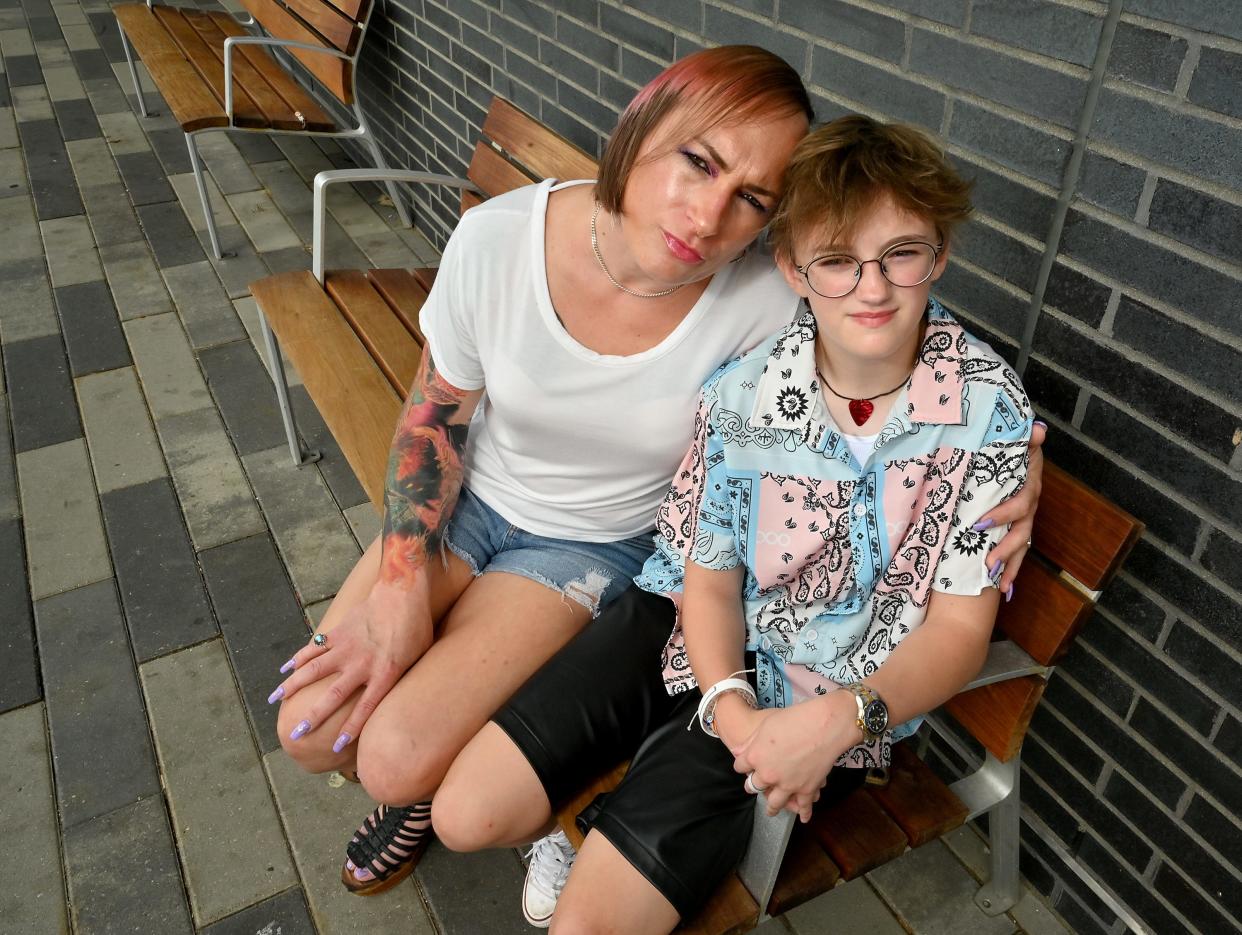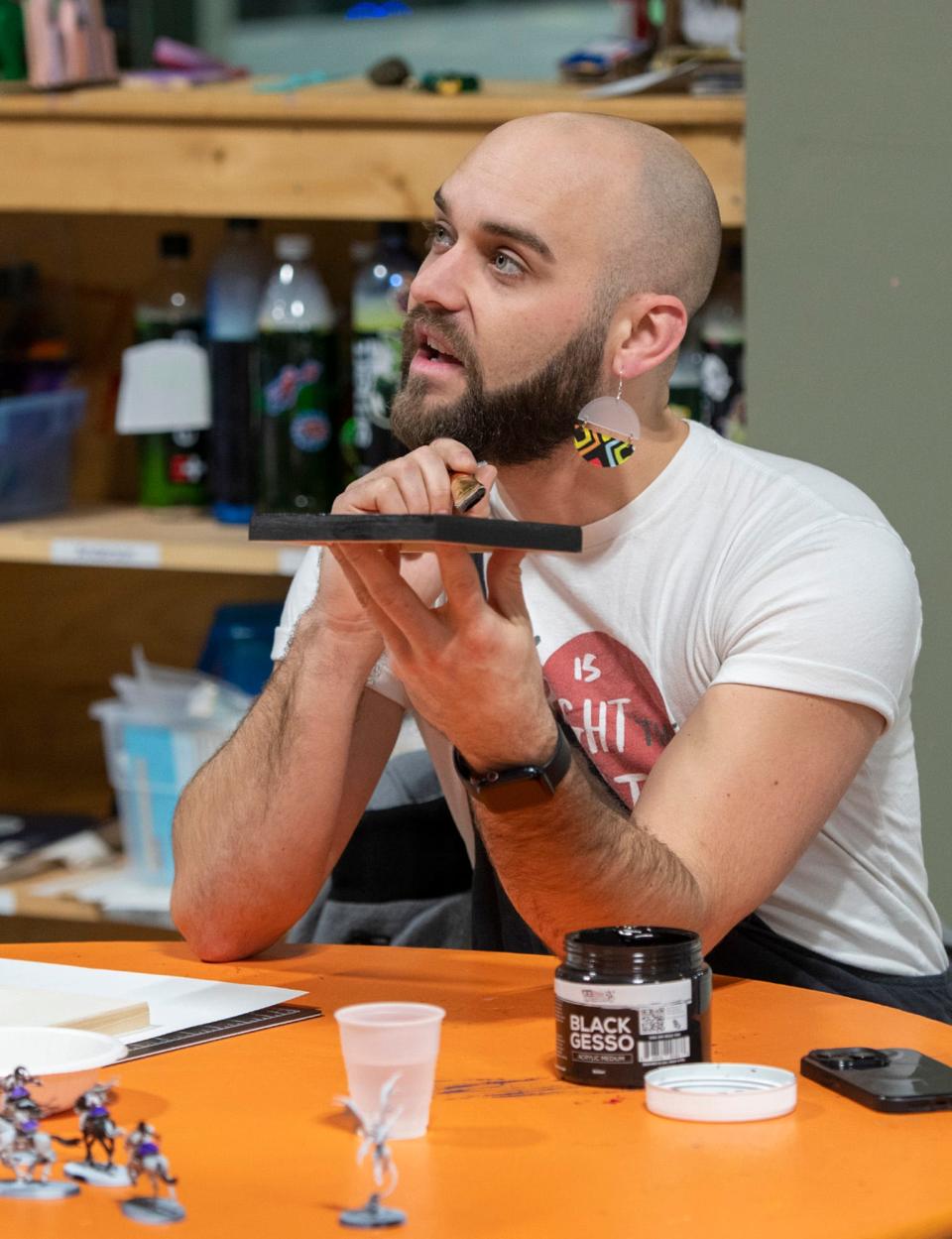Queer community pushes back against treatment of LGBTQ+ students by Worcester Diocese

- Oops!Something went wrong.Please try again later.
WORCESTER - The announcement from the Worcester Diocese earlier this month of new school policies regarding LGBTQ+ students has sparked a passionate response among Worcester’s queer community.
On Aug. 17, the organization Love Your Labels, in collaboration with the YWCA and MassEquality, launched a petition denouncing the new policy put forward by Bishop Robert McManus, which will apply to the 21 Catholic schools under the diocese. The petition, which gathered over 1,000 signatures by Tuesday evening, calls for the Roman Catholic Diocese of Worcester to revoke the policy.
The new policy, titled “Catholic Education and the Human Person,” has been added to the student handbook for the upcoming school year. It prohibits same-sex relationships and expressions, behaviors inconsistent with birth-assigned sex or actions deemed to cause “confusion or disruption,” with penalties for violation up to expulsion.
Not every school in the diocese is planning to comply with the new policy. Representatives from St. John’s High School in Shrewsbury and Notre Dame Academy in Worcester wrote a joint letter to McManus stating they would maintain their current policies and would not be adopting the new one.
It's not the first time a Catholic school has resisted a directive from McManus. Last summer, the Nativity School of Worcester refused to take down Pride and Black Lives Matter flags, which the bishop stated represented values at odds with Catholic doctrine. McManus responded by prohibiting the Nativity School from calling itself a Catholic school.
'My role is not to change religion'
Joshua Croke, president of Love Your Labels, understands that diocesan schools must align with Catholic doctrine, but says the changes to the student handbook go too far and come at the expense of students' well-being.
“My role is not to change religion,” said Croke. “What I can tell you is that what we know to be true though studies and research that unaffirming spaces lead to anxiety, depression and suicide attempts in young people.”

Croke said that even one supportive adult can lower the chance of attempted suicide by as much as 40%, but the new policy prevents educators and staff from offering support to vulnerable students.
“If you can’t express yourself, that’s one thing, but you’re now preventing the people who can help these children. That is a harmful practice,” said Charlie O’Donnell, a 2012 graduate of St. Paul’s Diocesan Junior/Senior High School in Worcester, formerly known as Holy Name Central Catholic High School and a board member of Love Your Labels.
“There are teachers who will use a kid’s chosen name and pronouns, but this policy creates an environment where those teachers are compromised,” said Croke.
What's in a name
Finn Santora, 14, encountered some of these teachers when he was at St. Paul’s. While none would refer to him using he/him pronouns, they had at least used his preferred name. The situation came to a head at the end of last school year, during an event commemorating the end of eighth grade, when school administrators insisted on using his old name from his birth certificate — a practice known as deadnaming.
“They continue to say that these children will be respected and treated with dignity but you can’t say that and then at the same time refuse to acknowledge somebody’s name,” said Finn’s mother, Jai Santora. “It’s just refusing to respect a person’s ability to make a decision.”
Jai Santora reached out to St. Paul’s to discuss the matter and when the school refused to alter its stance, she removed Finn from the school. He is now enrolled for this year at Shepherd Hill Regional High School in Dudley.
St. Paul’s did not respond to a request for comment from the Telegram & Gazette.
While she cannot say for certain that Finn's case led to the new diocese policy, Santora said “the timeline stands to reason.”
“My first reaction was that I made it worse for other kids,” said Finn, upon hearing about the new rules. “I know a lot of people who want to come out but they’re too afraid now.”
That changed when others began coming forward with their own stories of discrimination and bullying at the school.
Finn said he’s “proud” to have inspired others who were previously hesitant to share their experiences. With the new diocese policy, “a lot of people are realizing what’s going on and they know that it’s wrong.”
“I think it’s great that through Finn defending himself and standing up for himself, we are now getting all of this brought to light by the diocese itself,” said Santora.
Making official the de facto
Maxfield Nadeau-DaCruz, 20, who goes by they/them pronouns and attended Holy Name from 2017 to 2020 before transferring to Doherty for their senior year, said that based on their experience, the outlined policy is stating out loud what has already been in place for years.
“It’s always kind of been like this but they’re just putting it into words at this point,” said Nadeau-DaCruz. “I was always waiting for them to come out and say it and after three years they have.”
Following the announcement, Nadeau-DaCruz, along with another former student, posted on Instagram describing their experiences as transgender students at St. Paul’s, which at the time was Holy Name High School.
In 2018, Nadeau-DaCruz spoke to the guidance department about using their preferred name and pronouns at graduation along with robes matching their self-identified gender, as colors were different for boys and girls. They were assured by the department that this would not be a problem, only for “the administration to do a complete 180,” and insist they must use their assigned birth name and pronouns.
In late 2019 and early 2020, Nadeau-DaCruz and other students had a petition at school and online denouncing the treatment of transgender students at the school, which accumulated about 1,000 signatures. They said they were forced to take it down.
Fractures in the faith
Croke hopes that more schools and community members will follow the lead of St. John’s and Notre Dame when it comes to following the new policy.
“We’re encouraging practicing Catholics who know how harmful this is to stand up and say they will not support this,” Croke said. “The folks with the most power right now are the parishioners and priests who can come together and I hope they choose love.”
O’Donnell said he has been receiving messages of encouragement from former teachers at Holy Name. “I’ve had (multiple teachers) reach out saying they’re proud of what we’re doing and standing up for this with this petition."
“We can argue religion until we’re blue in the face,” said Croke. “But I can say that the organizations and individuals standing behind this petition are actively in support of our young people and I don’t think the bishop could make that same argument.”
This article originally appeared on Telegram & Gazette: Calls to resist Worcester Diocese policy toward LGTBQ+ students

